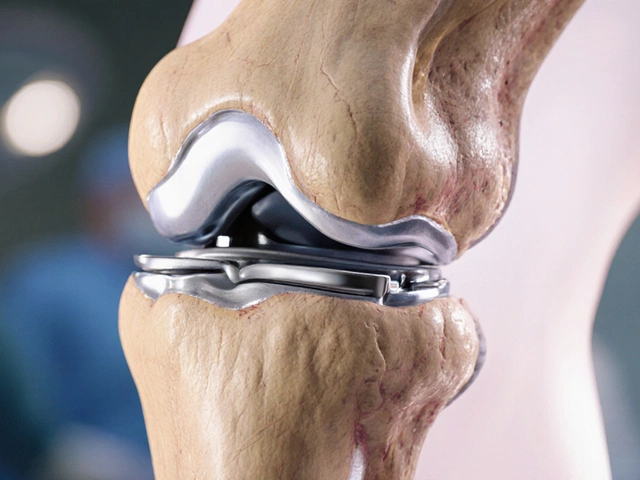Heart surgery is a daunting yet often necessary step towards a healthier future. Once the surgery is complete, the journey of recovery begins, which is both a physical and mental endeavor. Adjusting to life after heart surgery involves significant lifestyle changes that can feel overwhelming if not approached with the right mindset. However, with determination and the right support, it is possible to not only recover but thrive.
Understanding the goals and milestones in the recovery process is crucial. From regaining physical strength through structured rehabilitation programs to adapting one’s diet, every step is intended to nurture the heart back to its optimal health. Equally important is addressing the emotional well-being that accompanies the surgical experience. Family, friends, and healthcare professionals play a vital role in supporting the patient's journey to wellness.
- Understanding Recovery Milestones
- Emotional and Mental Well-being
- Physical Activity and Rehabilitation
- Diet and Nutritional Adjustments
- The Role of Follow-up Care
- Building a Support Network
Understanding Recovery Milestones
The journey following heart surgery is like learning to navigate through a new landscape, one that is overwhelming yet hopeful. Each person's recovery timeline may vary, influenced by factors such as age, the type of surgery, pre-existing conditions, and overall health. Yet, some common milestones and stages help to anchor this journey, providing patients and their families with a roadmap towards healing.
Initially, the focus is on overcoming the immediate aftermath of surgery. This period, typically encompassing the first 7-10 days, revolves around the body's acclimatization to changes. Patients often begin their journey in an intensive care unit where they are closely monitored as anesthesia fades and vital signs stabilize. It's crucial here to manage pain effectively, ensure proper wound care, and initiate light breathing exercises. Such initial steps are foundational for preventing complications like pneumonia or clot formation.
As patients move from hospital to home, the next stage emphasizes returning to daily living with caution and care. During the first few weeks post-surgery, activities are deliberately restricted to allow the heart and incisions time to heal properly. Walking, as encouraged by doctors, is an essential part of recovery at this point, softly reintroducing physical activity without overburdening the healing process. It is during this time that many patients enlist in cardiac rehabilitation programs, which can help tailor a safe exercise regimen.
From weeks four to eight, the focus shifts towards regaining independence and confidence. This is often when patients notice significant recovery in strength and energy levels. Importantly, this period encourages individuals to assess their diets, adopting heart-friendly practices and eliminating harmful habits. Balanced nutrition tailored towards heart health contributes immensely to this stage, as it provides the necessary nutrients for recovery without adding undue stress to the cardiovascular system.
An insightful resource by the World Health Organization emphasizes, "Rehabilitation is not merely an end goal but an ongoing process to improve quality of life."
Heart surgery recovery requires patience and dedication, but with steadfast effort, individuals can achieve a quality of life that seemed distant before their operation.Indeed, maintaining proactive follow-up appointments with healthcare providers ensures that these critical milestones are supported by professional oversight. During these visits, doctors often review progress, adjust medications, and discuss any arising concerns, reinforcing the path towards full recovery.
To encapsulate, grasping and adhering to these recovery milestones fosters both physical healing and psychological empowerment. Recognizing each achievement, however small, contributes significantly to motivation, building the resilience needed for a successful post-surgery journey. With an informed approach, tailored care, and supportive network, patients can indeed navigate their post-surgery life and emerge on the other side with newfound vigor and perspective.
Emotional and Mental Well-being
After undergoing heart surgery, it's not uncommon to experience a whirlwind of emotions. The physical strain of the procedure often spills over into emotional and mental realms, creating unique challenges. Patients may find themselves facing anxiety about their future health, dealing with stress about lifestyle changes, or even confronting feelings of sadness due to temporary limitations. Recognizing and addressing these emotions is just as critical to post-surgery life as any physical recovery regime.
Anxiety is a frequent companion after heart surgery. Concerns about potential complications, fear of returning to normal activities, and apprehensions about long-term recovery can all contribute to heightened stress. Research indicates that nearly one in five heart surgery patients experience clinically significant anxiety levels. It's important for patients and their families to acknowledge these feelings are completely normal.
"The first step towards managing stress after heart surgery is to talk about it," suggests Dr. Elizabeth Jackson, a renowned cardiac psychologist, emphasizing the importance of communication.
Another common experience is the feeling of isolation, which might stem from a temporary inability to partake in social activities or an impression that others can't fully comprehend the ordeal. Joining support groups or connecting with individuals who have undergone similar surgeries can provide a sense of community and shared understanding. Encouraging these connections can significantly enhance one’s emotional resilience.
Depression following heart surgery is not uncommon and may impact a patient's motivation to engage with recovery processes. The American Heart Association highlights that up to 25% of patients experience some level of depression post-operatively. Healthcare providers usually look out for signs of depression as part of their post-operative care routine, offering counseling or medications when necessary. Cardiac rehabilitation programs often include psychological support, which is key in addressing these mental health concerns. Regular appointments with a mental health professional, involvement in therapeutic activities, or simple mindfulness exercises like meditation and yoga can make a marked difference.
- Engage in activities that bring joy and relaxation.
- Develop a routine that includes mental wellness exercises.
- Encourage open discussions about emotional struggles with healthcare providers and family members.
Lastly, fostering a positive mindset can significantly impact recovery outcomes. Studies show that patients who maintain a hopeful outlook and actively participate in their recovery tend to experience better physical and mental health improvements. This proactive approach often translates into constructive changes in behaviors that are vital for a healthy heart. While it’s important to acknowledge the emotional hurdles, cultivating optimism can be a powerful tool in coping with life after heart surgery.

Physical Activity and Rehabilitation
Physical activity and rehabilitation are crucial components in the recovery journey after heart surgery. Often, the thought of engaging in any form of exercise post-surgery can be intimidating, yet it is essential to realize that measured and supervised physical activity actually facilitates healing and improves heart function. The body is an adaptable entity, capable of recovery and growth even after experiencing significant events like surgery. Rehabilitation programs are meticulously designed to be progressive, meaning they start gently and gradually increase in intensity. These programs aim to help individuals regain their strength without putting undue pressure on the heart.
The first few weeks are usually the most challenging, as the body is still in the early stages of healing. Initially, simple activities like walking might seem like monumental tasks. However, as the weeks go by, these exercises form the foundation for more extensive movements. This isn't just about physical health; it also aids in rebuilding confidence. Including cardiac rehabilitation as a part of recovery offers a structured approach to incorporating physical activities. Cardiac rehab programs typically include exercise counseling, customized exercise routines, and nutritional guidance tailored to the individual’s current health status and future heart health goals.
According to the American Heart Association, patients participating in supervised cardiac rehabilitation programs experience a decrease in hospital readmissions, enhanced survival rates, and an overall improvement in quality of life. A study revealed that those who underwent cardiac rehabilitation were 25% more likely to maintain long-term health stability compared to those who didn’t. These programs not only focus on the physical but extend to coaching on stress management, which is a critical factor in heart health.
"Exercise is an essential component of good heart health and is integral to improving your heart's recovery. A solid rehab plan can transform apprehension into empowerment," says Dr. Mohandas, a reputed cardiologist.
For someone transitioning from a sedentary lifestyle to a more active one after surgery, patience is key. Here are some core elements often emphasized during rehabilitation:
- Starting with short, moderate-intensity activities like walking and stretching.
- Gradually increasing duration and intensity based on personal tolerance and doctor recommendations.
- Incorporating activities that enhance flexibility and balance for added benefits.
- Regularly monitoring vitals to adjust the plan as necessary.
Remember, the road to recovery isn’t a race but a journey. Engage in activities that you enjoy and feel comfortable doing. Some statistics suggest that patients who engage in functional daily exercises have a 15% faster recovery rate, underscoring the importance of keeping active post-surgery. Always communicate with your healthcare providers about your progress and any concerns, ensuring your regime remains appropriate and beneficial. Incorporating family or friends into these activities can provide motivation and make the process feel less daunting.
Diet and Nutritional Adjustments
Transitioning into life post-heart surgery presents its unique challenges, and adopting a heart-healthy diet is one of the most crucial elements of recovery. This change not only aids in the healing process but also helps prevent future cardiac issues. Patients are often advised to implement a diet rich in fruits, vegetables, whole grains, and lean proteins. This approach is instrumental in controlling cholesterol levels, lowering blood pressure, and maintaining a healthy weight. An important guideline is to minimize the intake of saturated fats, trans fats, and other high-calorie foods that can contribute to clogged arteries and increased heart disease risk.
One practical adjustment involves embracing a Mediterranean-style diet that emphasizes healthy fats like olive oil, nuts, and seeds while prioritizing fatty fish such as salmon or mackerel. These foods are high in omega-3 fatty acids, which have been shown to help reduce inflammation and improve heart health. Incorporating legumes, such as lentils and beans, provides ample fiber, which is essential for lowering cholesterol. Regular hydration is equally important, encouraging individuals to drink plenty of water throughout the day while limiting sugary beverages which offer little nutritional benefit.
In dietary adjustments, sodium intake should also be carefully monitored. Consuming excessive salt is known to increase blood pressure, a major risk factor for heart complications. Reducing processed and packaged foods, which are often high in sodium, is a wise choice. Instead, enhancing meals with herbs and spices rather than salt can not only boost flavor but enhance overall health. It's beneficial to employ a dietary approach like 'DASH' (Dietary Approaches to Stop Hypertension), which has been well-documented to improve heart health outcomes.
A balanced diet tailored to recovering from heart surgery provides room for personalized preferences while meeting specific nutritional goals. It can be helpful to work with a dietitian to construct a meal plan that aligns with individual health needs and lifestyle. Regular dietary check-ins aid in staying on track and help identify areas for improvement. Engaging with local cooking classes or heart health workshops can further educate and empower individuals to make informed dietary decisions.
Reflecting on dietary guidance, it was famously stated by the American Heart Association that,
"The foods you choose can have a big impact on your heart's health and longevity. A meal plan that includes vegetables, fruits, whole grains, and healthy proteins is a powerful tool to reduce the risk of heart disease."Emphasizing informed eating practices in everyday life can be a continuous catalyst for improved cardiovascular health.

The Role of Follow-up Care
After undergoing heart surgery, the idea of follow-up care might seem like just another appointment to add to your calendar, but it's a crucial component of the healing journey. Consistent follow-up care helps ensure the success of the surgery by monitoring the patient’s recovery and identifying any potential complications early. These appointments are specially designed to track your cardiovascular health progress, addressing both the healing of your surgical incision and the functionality of your heart. Staying attentive to follow-up sessions can significantly impact your long-term recovery.
During these follow-up visits, your healthcare team will assess your physical heart condition, looking for signs of improvement and any indications of issues that need immediate attention. Routine tests such as EKGs and blood work can unveil hidden complications that might not be visible through physical symptoms alone. It’s a proactive measure to ensure that your heart health is on the right track and that any adjustments to your treatment plan are made promptly. These visits are not just about checking vital signs; they are opportunities for you to discuss any concerns or symptoms you're experiencing, no matter how insignificant they might seem.
Moreover, follow-up care provides emotional support and reassurance for patients. Dealing with anxiety or fear of future health problems is common after significant medical procedures. During these visits, specialists not only guide patients through their recovery but also provide them with the confidence needed to make necessary lifestyle changes. Engaging in open discussions with your cardiologist can help address stress and empower patients to take control of their recovery. As Dr. Jane Smith from the National Heart Institute famously said,
"Follow-up care acts as a safety net, providing peace of mind to help a patient walk confidently through recovery.”
Another critical role of follow-up care is in reinforcing dietary recommendations. After heart surgery, patients must often adopt new nutritional habits that promote heart health. Follow-up visits are an excellent time to review these changes with a dietitian or your cardiologist, ensuring that your daily diet aligns with your recovery goals. In some cases, additional nutritional testing might be done to customize your dietary needs further, making sure your recovery progresses optimally. This personalized attention can prevent future heart issues and help sustain a healthy heart.
Additionally, a vital component of these appointments is patient education. Learning about the signs of potential complications and understanding how to manage your own heart health at home is crucial. Clinicians take these opportunities to equip patients with information on recognizing symptoms that require immediate medical attention, understanding medication management, and gently nudging them toward healthier lifestyle choices. A well-informed patient is often a successful one, and follow-up sessions are key to making sure that all necessary knowledge is imparted effectively.
Building a Support Network
Recovering from heart surgery is rarely a journey you should tackle alone. Developing a robust support network can be an essential pillar in your pathway to recovery and long-term heart health. A good support system not only eases the burden on the individual but also enhances emotional and physical recovery. Family and friends are often the first line of defense, providing encouragement and helping with day-to-day activities as patients regain independence. Their involvement can lessen stress and infuse a patient’s recovery journey with warmth and love, which is just as vital as medical care. Recognizing the need to share experiences with others who understand, many join support groups.
Support groups, whether in-person or virtual, provide a unique space for individuals who have undergone heart surgery to come together and share their experiences. This communal approach fosters a sense of belonging and understanding. Participating in these group discussions can often lead to exchanging valuable tips for navigating this unique life phase. Some people may find solace in expressing their fears and triumphs among others who have experienced similar challenges, ultimately reducing feelings of isolation.
For a more structured approach to post-surgery life, cardiac rehabilitation programs are invaluable. These programs often include support networks as part of their recovery structure, integrating medical guidance with peer support to comprehensively address both physical and emotional aspects of recuperation. Statistics from the American Heart Association suggest that patients who engage in these programs show notably better recovery outcomes.
To effectively build such a network, it is important to communicate openly about personal needs and limitations. This candidness invites mutual understanding and constructive assistance. Additionally, professional counseling can augment the support received from family and peers by addressing deeper emotional challenges that might emerge during recovery.
Consider leveraging social media and online forums that are specifically tailored for heart surgery patients. These platforms host communities filled with shared experiences, offering the convenience of connection without geographic constraints. Through these digital networks, tips on heart health, dietary plans, and recommended physical activities are readily exchanged, often leading to practical and actionable advice for optimizing one's lifestyle post-surgery.
"The strongest hearts have the most scars." This quote reflects the resilience many patients embody and is a reminder of the strength found within. Leaning on a support network can encourage this resilience, pushing patients to achieve beyond their expectations.
The importance of a support network resonates beyond the immediate recovery phase. Building relationships that fuel encouragement and understanding can lead to long-lasting improvements in lifestyle choices, ensuring that the positive changes made during recovery are maintained for a lifetime. Integrating such a network into daily life post-surgery is an enduring way to celebrate heart health and the new lease of life that heart surgery brings.

 Can You Kneel After Knee Replacement? What Really Happens and When You Can Expect to Kneel Again
Can You Kneel After Knee Replacement? What Really Happens and When You Can Expect to Kneel Again
 Complimentary Health Check-Up: Meaning, Inclusions, Benefits, and How to Use It (India 2025)
Complimentary Health Check-Up: Meaning, Inclusions, Benefits, and How to Use It (India 2025)
 The Most Diagnosed Mental Disorder Worldwide: Anxiety Disorders Explained
The Most Diagnosed Mental Disorder Worldwide: Anxiety Disorders Explained
 Hidden Facts Doctors Skip About Knee Replacement Surgery
Hidden Facts Doctors Skip About Knee Replacement Surgery
 Easiest Types of Cancer to Beat: Survival Rates Explained
Easiest Types of Cancer to Beat: Survival Rates Explained